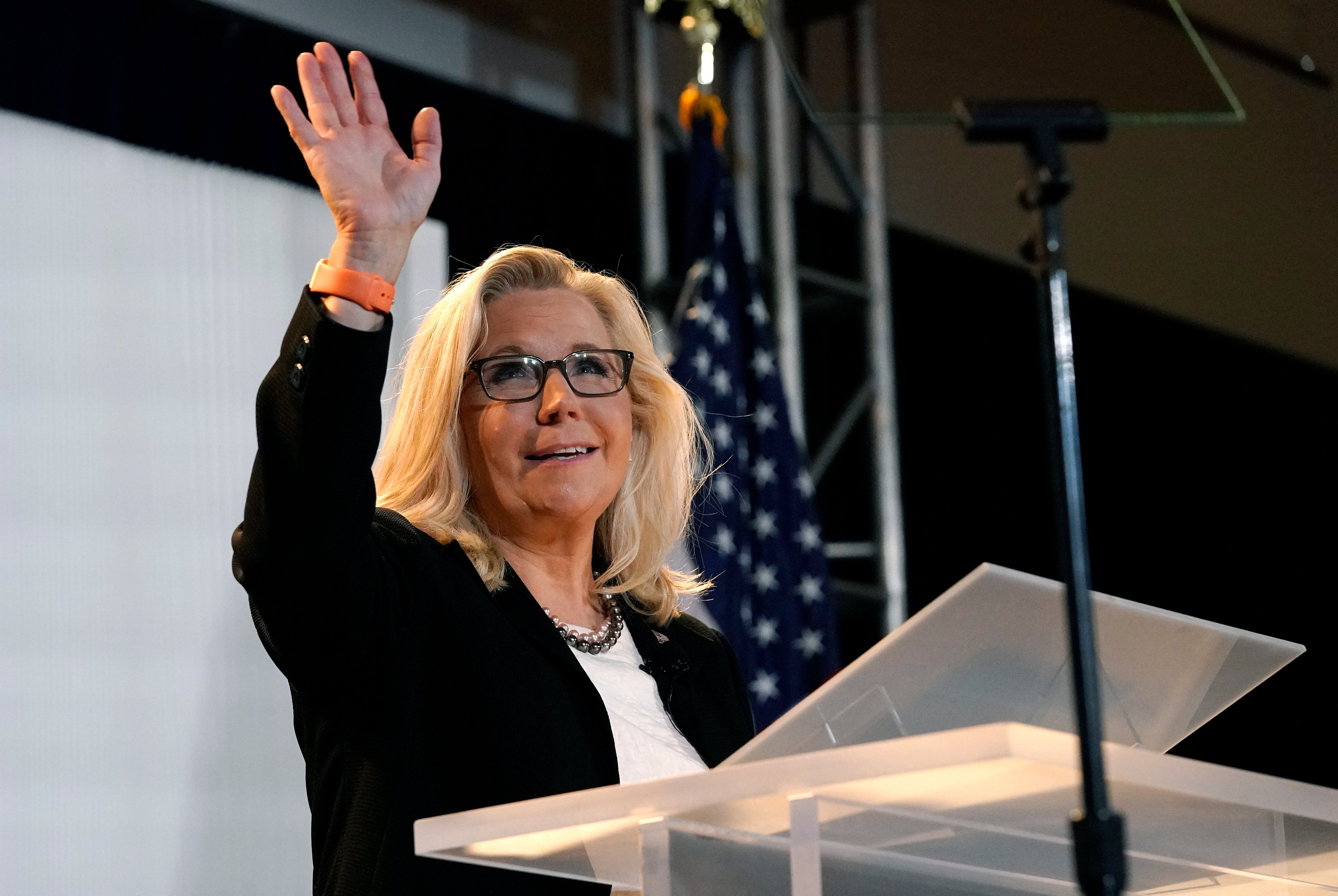The Independent's journalism is supported by our readers. When you purchase through links on our site, we may earn commission.
Liz Cheney has lost the battle — but she might win the war in 2028
Cheney has spoken at length about how the pro-Trump wing of the Republican party will be judged by history. She may see this loss to Trump-endorsed rival Harriet Hageman as a temporary setback before making a triumphant return in the near future


Your support helps us to tell the story
From reproductive rights to climate change to Big Tech, The Independent is on the ground when the story is developing. Whether it's investigating the financials of Elon Musk's pro-Trump PAC or producing our latest documentary, 'The A Word', which shines a light on the American women fighting for reproductive rights, we know how important it is to parse out the facts from the messaging.
At such a critical moment in US history, we need reporters on the ground. Your donation allows us to keep sending journalists to speak to both sides of the story.
The Independent is trusted by Americans across the entire political spectrum. And unlike many other quality news outlets, we choose not to lock Americans out of our reporting and analysis with paywalls. We believe quality journalism should be available to everyone, paid for by those who can afford it.
Your support makes all the difference.By rejecting Rep. Liz Cheney (R-WY), the Republican Party has just once again unmistakably told us who they are. We should believe them.
From the third-highest ranking leader in the House GOP to an outcast in her own party, Liz Cheney’s Wyoming primary loss is emblematic of the Republican Party’s descent into authoritarian madness. In what looked like it would be a wide double-digit defeat, Cheney lost her congressional seat to Trump-backed candidate Harriet Hageman. This comes after she spent the last year as Vice Chairwoman of the January 6 Committee, where she ferociously condemned and investigated Trump for his ongoing assault on American democracy.
After Cheney was ousted from her leadership role as House GOP Conference Chair last year, I wrote about how the move created a litmus test for the Republican party’s brand of authoritarianism and fealty to Trump, as they united around the Big Lie. What happened next speaks for itself. With Cheney’s loss, eight out of the 10 House Republicans who voted to impeach Trump over January 6 have now either lost their primaries or announced their incoming retirements. And in primaries across the country, Republicans have nominated numerous 2020 election-deniers for state and federal seats, including positions that have a direct role in the election certification process.
Cheney’s journey from rising conservative star to this moment is worth analyzing. She was elected in 2016 to the same seat her father, Dick Cheney, first won 44 years ago. While she did levy mild criticism of Trump occasionally, she would go on to vote for Trump’s positions about 93 percent of the time. Her record is as conservative as they come. She was popular and consistently in lock-step with the party. But everything changed on January 6.
After Trump’s effort to overturn the 2020 election culminated in the violent Capitol attack, Cheney released a statement that would foreshadow her work over the next year, stating: “There is no question that the President formed the mob, the President incited the mob, the President addressed the mob. He lit the flame... there are serious questions about the President’s involvement and responsibility for what happened here tonight, here today at the Capitol, and it cannot be tolerated.”
On January 12, 2021, Cheney voted to impeach Trump. There was an early attempt to oust her from House leadership that failed a month later, but she was already facing fierce rebukes at home. The Wyoming GOP overwhelmingly voted to censure her on February 6, 2021. For months after that, friction increased between Cheney and House Minority Leader Kevin McCarthy (R-CA), as she continued to speak out against the Big Lie while McCarthy cozied up to Trump.
Tensions came to a head in May after Cheney delivered her most devastating takedown of the Big Lie and Trump yet in a Washington Post op-ed, calling for Republicans to “steer away from the dangerous and anti-democratic Trump cult of personality.” Cheney proclaimed that “history is watching” in the same article. House Republicans wasted no time in showing what side of history they were on.
On May 12, 2021, McCarthy led a vote to oust Cheney from her position as House GOP Conference Chair. The party’s post-January 6 capitulation was complete. Cheney was ousted from GOP leadership, but that was far from the last we saw of her.
In June 2021, House Speaker Nancy Pelosi (D-CA) formed the January 6 Select Committee and appointed Cheney and Rep. Adam Kinzinger (R-IL) as the two Republican members. Cheney was designated as vice chair. A year of investigations culminated in hearings this past summer, during which Cheney often took center-stage, incisively outlining Trump’s direct role and calling for criminal accountability.
Before her primary this week, both Trump and McCarthy endorsed Cheney’s opponent. That didn’t change things much, considering that the Wyoming GOP had already effectively kicked her out of the party. In an interview with Fox News on Monday, McCarthy called Tuesday’s primary between Cheney and Hageman “a referendum on the January 6 Committee.” To some extent, he’s right. Republican voters have had an opportunity to see the facts related to the insurrection and Trump’s clear role. And yet, they’ve chosen to ignore them or believe a right-wing media spin. They’ve chosen to end a woman’s congressional career for standing against the clear and present threat to democracy that is Donald Trump.
The easy and selfish route for Cheney would’ve been to fall in line with Trump’s undemocratic lies and to chase more clout and power. That was the case for the lawmaker who replaced her as House GOP Conference Chair, Rep. Elise Stefanik (R-NY). Stefanik went from moderate to a radical Trump sycophant in a very short amount of time. But Cheney chose to take a stand on principle, even if it meant losing power.
There is certainly a lot that critics can condemn about her very conservative stances on important issues, and indeed it can be difficult to reconcile some of Cheney’s pro-democracy statements with her position on voting rights. But her work on the January 6 Committee stands for itself as an honorable feat of courage. It’s possible for all of these facts to exist at the same time.
So what is in Liz Cheney’s future? We’ll see more of her in the upcoming January 6 hearings this fall and there could be a lot more to come after that. Her speeches on the committee have always been made with a national audience in mind. She has forcefully made the case against Trump and today’s iteration of the GOP a number of times. One has to wonder if she will bring that case to the Republican primary stage in 2024.
The chances of Cheney winning a national primary are slim, of course, given the base’s clear preference for figures like Trump and Florida governor Ron DeSantis. But perhaps her voice could make an impact on independent voters and any remaining moderate Republicans ahead of the general election. Cheney is only 56 years old. Could she be setting the stage for a comeback in 2026? Does she harbor ambitions to lead a less radicalized Republican party as far away as 2028? Only time will tell.
In the first January 6 Committee hearing, Cheney delivered a message to the Republican party that rings even truer today than when she said it: “There will come a day when Donald Trump is gone, but your dishonor will remain.” Regardless of how the future unfolds, history will always remember those who stood against authoritarianism and the cowards who fell in line. When it comes to Donald Trump specifically, Liz Cheney was among those who stood up and declared that he is not who we are.
Join our commenting forum
Join thought-provoking conversations, follow other Independent readers and see their replies
Comments